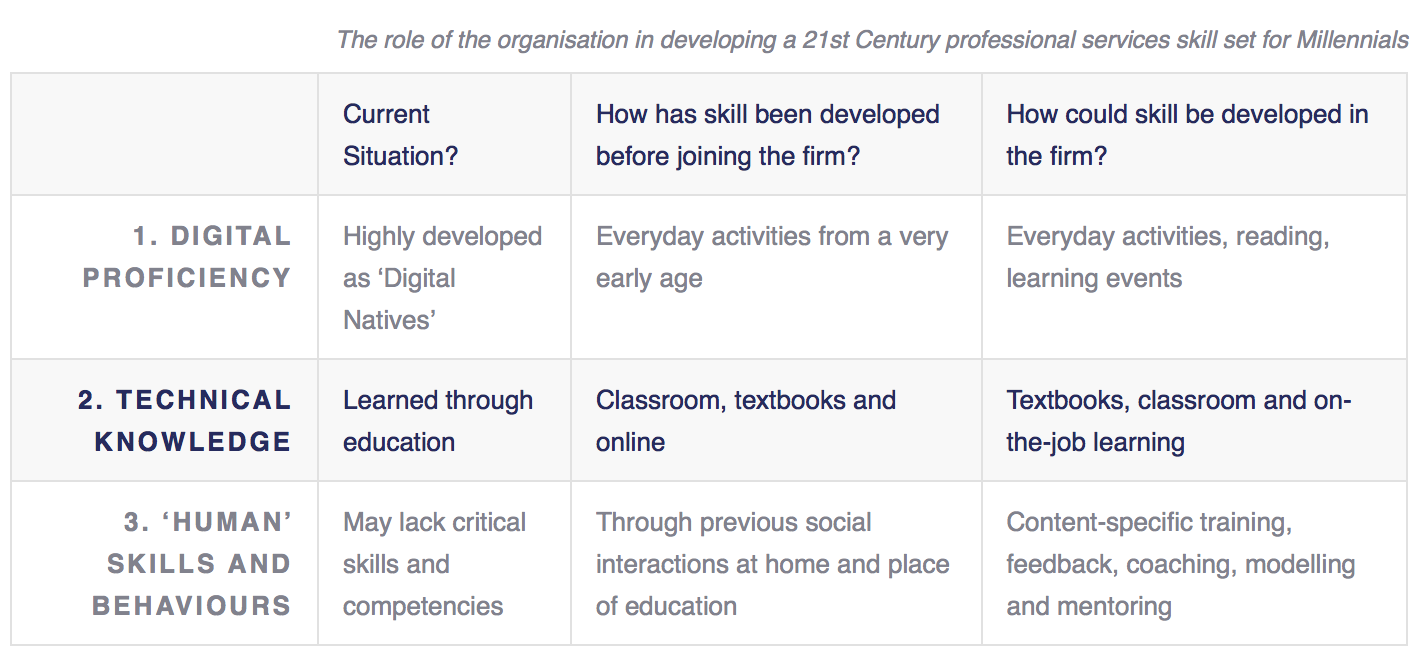Defining a professional services career skill set for Millennials
5 min read
Millennials may be entering the professional services workforce lacking critical skills and competencies, as suggested by employers in recent studies and also by Millennials themselves.
The 2015 Deloitte Millennials survey[i] found Millennials believe the skills gained in higher education only contribute a third of those required to achieve organisational goals with clear implications for firms and their future growth.
Our research and experience suggests a 21st Century professional services career skill set for Millennials consists of:
1. Digital Proficiency
2. Technical Knowledge
Which is most successfully applied when combined with:
3. ‘Human’ Skills and Behaviours

1. Digital Proficiency’
Millennials are digital ‘natives’ and the majority are highly proficient when it comes to technology. In contrast to older colleagues, the millennial generation have never known anything but digital.
Being digitally proficient, Millennials are ideally placed to help businesses take advantage of the opportunities offered by technology and digital that will continue to arise.
Millennials are used to instant communication and collaboration, mainly online. They are accustomed to accessing huge amounts of information at the touch of a button and they are comfortable embracing new ideas and technology and adapting these advances into their lives.
On the other hand, being a digital native may lead to shortcomings in other areas of skills and behavioural development required in professional services, particularly with regards to ‘human’ skills that cannot be replaced by a machine, such as critical thinking and communication.
The rise of ‘digital’ has led to a proliferation of data, with instant access to more amounts of information than has ever previously been possible.
The overflowing availability of data means that potential answers are easy to find without too much effort (‘just Google it’) and individuals may become lazy, prejudge (confirmation-bias), expect instant gratification and be satisfied to go for the obvious, instant, easy solutions. The prevalence of information also means it is much easier to get ‘lost in the data’ and waste time, money and effort looking in the wrong place if firms do not have a structured analytical thinking process in place.
Critical thinking is a diminishing art and digital natives may become reliant on computers becoming a substitute for thinking – worrying for professional services, where it is critical thinking that provides real value to clients and the firm.
While technology makes employees more productive some ways, being forever connected to smartphones, tablets, laptops, and other electronic devices has caused many corporate cultures to speed up and become ‘always on’, leading to a never-ending cycle of unreasonable expectations (both internally and with clients) and a reduction in creativity, innovation, insight and true productivity.[ii]
Recent neuroscience and psychology research show that constantly turning to electronic devices at work inhibits an important business behaviour – day-dreaming. While managers might argue this is no bad thing, it has been found that ‘mind-wandering’ actually facilitates creativity, planning, and putting off immediate desires in favour of future rewards – important behaviours for working effectively.[iii]
Similarly, recent research describes how too much screen time induces stress reactions, disrupts sleep, desensitizes the brain’s reward system, overloads the sensory system, depletes mental reserves and fractures attention.[iv]
Finally, growing up in a world with endless connection to electronic devices means social media and online collaboration may have superseded ‘human’ interaction with a subsequent reduction in the quality of communication, networking and listening skills attained – fundamental requirements sought by business leaders within professional services.
2. Technical Knowledge
Excellent technical knowledge (professional, vocational, occupational) is essential to succeed in today’s world of professional services. Mastering theory and staying on top of industry changes (Legal / accounting / marketing / finance / consulting) is a pre-requisite.
Attaining technical knowledge forms the basis of many further education programmes and entry-level positions within organisations.
Technical excellence however, should not come at the expense of other key business behaviours. Organisations perhaps need to develop ‘Bilinguals’ (as coined by David Meer of Strategy&) – technical experts who can speak both ‘technical language’ but also understand the wider language of business.[v]
As well as being technically proficient, “Bilinguals” need to learn, develop and practice other key behaviours required to succeed in business, with particular attention given to: mastering communication and presentation skills; understanding how business decisions are made; and developing soft skills and nurturing emotional intelligence.
Similarly, career development within professional services firms often leads to young professionals becoming technical experts by being encouraged to specialise in a specific service line and sector and promoted according to this specific ability. Inevitably, employees become too specialised and too narrow to be effective ambassadors or leaders of the firm. They become ‘super-managers’ rather than partners-in-waiting. They have become ‘I-shaped’.
The personal identity of ‘I-shaped’ experts is rooted to their technical expertise, so they can struggle to learn and exercise broader commercial and consultative skills, particularly business development, listening and communication skills. Technical experts can lack the imagination to create context as they are disposed to focusing on solving existing problems and finding solutions, rather than using a more entrepreneurial focus to create future opportunities.
Instead, professional services firms should aim to develop ‘T-shaped’ experts, who have mastered technical skills and key human skills. T-shaped experts have the emotional intelligence to listen and understand the other people in the room and their decision making style, with curiosity to find the emotional and political causes of a business problem, not simply focussing on the rational reasons, and with the ability and faith to develop original and captivating original points of view.
Fundamentally, as illustrated above, Millennials working in professional services will most successfully apply technical expertise and digital proficiency when it is combined with…
3. ‘Human’ Skills and Behaviours’
Core business operations, whether business development, consulting, negotiation, presenting, leadership, relationship building, marketing, networking, change management, proposal writing, meeting management, brand development, R&D, innovation and engagement management (to name a few!) are all founded on learning, developing, refining and practising core ‘human’ skills and behaviours.
We call these ‘human’ skills and behaviours because they are acquired through human experiences, interaction, explanation, modelling, collaboration, coaching, feedback and mentoring. It is very difficult for ‘human’ behaviours to be codified, learnt from a textbook or Internet search.
Moving beyond the concepts of ‘soft skills’ and ‘emotional intelligence’, a recent study by the World Economic Forum and BCG[vi] categorises the ‘human skills and behaviours’ required to succeed in business into two groups: competencies and character qualities. We have taken these two groups and slightly adapted them below:
Competencies – Needed to approach complex challenges at work:
- Critical/Analytical thinking
- Problem Solving
- Diplomacy
- Time Management
- Communication
- Creativity
- Collaboration
- Writing skills
Character Qualities – Needed in the new work environment:
- Leadership
- Integrity
- Curiosity
- Adaptability / Flexibility
- Team player
- Initiative
- Patience
- Persistence / Grit /Determination
- Self-awareness
- Motivation / Positive Attitude
- Empathy
- Social skills
- Cultural awareness
Evidence suggests that a focus on human skills development will not only improve the quality of the new generation workforce and give firms a competitive advantage, it will also drive loyalty, productivity and engagement. Recent studies show the ability to learn regularly emerges as a key engagement driver for the Millennial generation however, only 15% of firms have put in place a specialised development programme for their millennial employees.[vii]
Our next Point of View article examines how we believe organisations might develop human skills and behaviours in their workplace and suggests a framework for implementation…
Part 4. Developing “Human” skills among the Millennial professional services workforce’
Millennials in Professional Services Special Report Series:

Part 1: Who are Millennials and why should professional services firms care?
Part 2: The Millennials’ Skills Gap – so what, why and what to do about it?
Part 3: Defining a professional services career skillset for Millennials
Part 4: Developing ‘Human Skills’ among the Millennial professional services workforce
References:
[i]Lillian Cunningham, “Are there too many consultants in the world?”,Washington Post, 14th November 2014
[ii]Emily Lawson and Colin Price, “The Psychology of Change Management” McKinsey Quarterly June 2003
[iii]Lorrie Lykins and Ann Pace, “Mastering Millennial Leadership Development,” T+D – American Society for Training & Development, May 2013 p.42-45
[iv]Dorothy Leonard, Gavin Barton & Michelle Barton, “Make Yourself an Expert” Harvard Business Review, April 2013
[v]“Who are the Millennials?” – Deloitte
[vi]Key skills and behaviour change in professional services – an industry snapshot 2014-15, PSfPS Participant Survey 2014-15, September 2015
[vii]Lisa Illingworth, “The Secret to Leading Millennials” Finweek, 4th December 2014 p.40
[viii] David Rock, Josh Davis & Beth Jones, “Kill Your Performance Ratings” Strategy+Business 8th August 2014, Autumn 2014, Issue 76
[ix] Karie Willyerd, “Millennials Want to Be Coached at Work” Harvard Business Review, 27th February 2015



